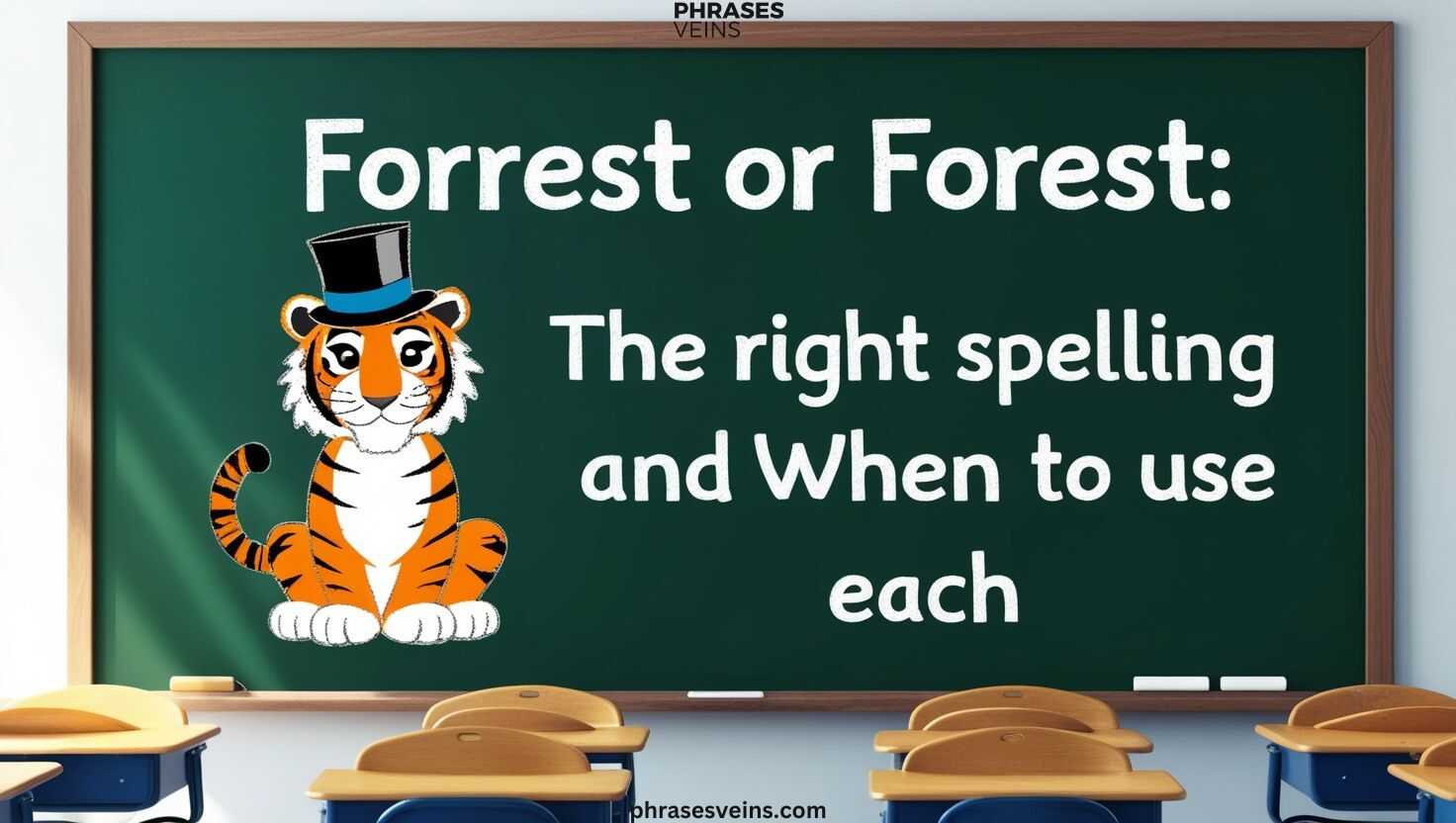Many people ask: Forrest or Forest? It’s a common spelling confusion that even native speakers make. The words sound similar, but they have different meanings and uses. Let’s explore the difference between Forrest and Forest, their correct usage, and how to avoid spelling mistakes in your writing.
Why Do People Confuse “Forrest” and “Forest”?
The spelling confusion between Forrest vs Forest happens because they sound almost the same. Both words also appear in literature, movies, and everyday conversations. For example, the famous movie Forrest Gump made the name “Forrest” popular.
People confuse them because English has many commonly mistaken words that are homophones. These are words that sound alike but have different meanings. To avoid misspelling, it’s important to know when to use each word correctly.
The Difference Between “Forrest” and “Forest”
| Aspect | Forrest | Forest |
|---|---|---|
| Type | Proper noun (name) | Common noun (natural environment) |
| Meaning | A person’s name | A large wooded area |
| Examples | “I met Forrest Gump yesterday.” | “We walked through the forest.” |
The main difference between Forrest and Forest is that Forrest is a proper noun, often used as a name, while Forest refers to a natural environment filled with trees.
“Forrest” Explained: Definition and Correct Usage
The name Forrest holds more meaning than just being a word. It is often used as a proper noun, especially in English-speaking countries. While it’s not as common today, it still appears in movies, literature, and family names. When you hear the word “Forrest,” you might think of someone with a strong connection to nature. But there’s more to it than meets the eye.
What Does “Forrest” Mean?
The word Forrest is a proper name used for people. It’s less common today but still seen in names like Forrest Gump. The name Forrest comes from Old English and means someone who lives near a wooded area.
Correct usage of Forrest is in contexts where you refer to a person’s name. For example:
- “Forrest invited me to dinner.”
- “The movie Forrest Gump won many awards.”
“Forest” Explained: Definition and Correct Usage
A forest is more than just a collection of trees. It represents an essential part of the planet’s natural environment, providing shelter to wildlife, producing oxygen, and maintaining the balance of ecosystems. When you hear the word “forest,” think of a large wooded area filled with trees, plants, and biodiversity. It’s a word that comes up frequently in conversations about nature and environmental health.
What Does “Forest” Mean?
A forest is a natural wooded area with trees, plants, and wildlife. Forested landscapes cover large parts of the world and play a big role in maintaining environmental health. Forests provide oxygen, regulate the climate, and support biodiversity.
You can use forest in both literal and figurative ways:
- “We went hiking through the forest.”
- “He can’t see the forest for the trees.”
Comparing “Forrest” and “Forest” Side-by-Side
Here’s a quick comparison to help you remember the correct spelling:
| Forrest | Forest |
| Proper noun | Common noun |
| A person’s name | Tree-covered land |
| Used in names like Forrest Gump | Describes a woodland or natural environment |
Everyday Scenarios for “Forest” and “Forrest” Usage
Here are some everyday scenarios to help you understand the usage of Forrest vs Forest:
- Forrest: “My friend Forrest loves camping.”
- Forest: “We saw deer in the forest during our hike.”
Origins of “Forrest” vs “Forest”: Understanding the Roots
The word Forest comes from Latin and Old French. It originally meant an open wooded area used for hunting. The name Forrest likely came from occupational surnames, meaning someone living near a woodland.
Both words have evolved over time, but their meanings remain distinct.
A Brief History: The Tale of Two Spellings
In history, spelling variations were common. The word Forest appeared in old texts as “foresta,” and Forrest was used as a name for people living near natural settings.
Today, both words are widely used but have clear differences.
READ MORE >>> Oversite vs Oversight: Which is the Correct Spelling?
“Forest”: Much More Than Just Trees
A forest isn’t just a wooded expanse. It’s a vital part of our ecosystem. Forests help reduce deforestation impact, protect wildlife habitats, and improve environmental health. They’re important for biodiversity and the planet’s survival.
“Forrest”: A Name That Holds Meaning Beyond Nature
The name Forrest goes beyond its connection to nature. It carries cultural, historical, and literary significance. In English-speaking cultures, Forrest is often seen as a symbol of resilience, strength, and connection to the natural world. The character Forrest Gump from the 1994 film made the name iconic, representing perseverance through life’s challenges.
Historically, the name Forrest comes from Old English and refers to someone living near a wooded area. Over time, it became a surname and later a first name. It evokes imagery of forests, nature, and adventure.
The name has been used in various contexts:
- Historical figures: Forrest as a last name appears in notable personalities.
- Literary references: In books, the name often symbolizes strength or closeness to nature.
In pop culture, the character Forrest Gump stands out as a beloved figure who embodies kindness, determination, and humility. His name connects with themes of growth and endurance, much like a forest that weathers storms but continues to grow.
Getting the Spelling Right: Tips for Everyday Use
Here are some spelling tips to help you remember:
- Forrest has two R’s and is a name.
- Forest refers to trees and nature.
- Use mnemonics: “Forrest is a friend with two R’s.”
Vocabulary Tips for Avoiding Common Mistakes
Avoiding spelling mistakes between “Forrest” and “Forest” can save you from confusion. Here are some grammar tips to help you remember the correct usage:
Quick Tips:
- Use “Forrest” only when referring to a person’s name.
- Use “forest” for a wooded area or natural setting.
- Remember that “Forrest” is a proper noun, while “forest” is a common noun.
Spelling Tricks:
- Think of Forrest Gump when writing the name.
- Picture trees and nature when spelling forest.
By keeping these tips in mind, you can avoid spelling confusion and write with confidence.
Which is Correct: “Forrest” or “Forest”?
It depends on the context. Use Forest when talking about a natural environment. Use Forrest as a name.
Examples:
- “We visited a beautiful forest in Oregon.”
- “I met Forrest at the event.”
Pronouncing “Forrest” or “Forest” Correctly
The words “Forest” and “Forrest” may sound similar, but they have subtle differences in pronunciation that can help you avoid confusion. The word “forest” is pronounced with two syllables: “FOR-ist”, with the emphasis on the first syllable. It sounds natural when describing a large, tree-filled area.
On the other hand, “Forrest” as a name is typically pronounced slightly differently, with a more balanced emphasis on both syllables: “FOR-est”. It may also be pronounced more distinctly when referring to a person’s name, especially in formal contexts.
Here are some pronunciation tips:
- Forest: Say it like “FOR-ist”, focusing on the first syllable.
- Forrest: Pronounce it more evenly as “FOR-est”, especially when referring to someone’s name.
Quick Pronunciation Guide:
| Word | Pronunciation | Usage |
| Forest | FOR-ist | Describes a wooded area |
| Forrest | FOR-est | Proper noun or person’s name (e.g., Forrest Gump) |
By practicing these subtle differences, you can ensure you’re using the correct word in both speech and writing. Proper pronunciation shows a clear understanding of the difference between Forrest and Forest and avoids unnecessary spelling mistakes in conversation.
Sample Sentences: Examples of “Forest” and “Forrest” in Action
Here are some sample sentences to demonstrate the correct usage of “Forest” and “Forrest” in different contexts:
Examples with “Forest”:
- We decided to explore the forest near our cabin.
- The Amazon forest is home to diverse wildlife.
- Hiking through the dense forest was an unforgettable experience.
- Forests play a critical role in reducing carbon dioxide levels.
- The children built a fort in the forest during their camping trip.
Examples with “Forrest”:
- Forrest invited us to his birthday party.
- The movie “Forrest Gump” is a timeless classic.
- I met a man named Forrest during my travels.
- Forrest told an interesting story about his family’s history.
- The name Forrest has become popular due to cultural references.
Frequently Asked Questions
How Do Americans Spell Forest?
In the United States, “forest” is spelled with one “r.” This spelling refers to a large area of land covered with trees and vegetation. It is the standard spelling used in American English for describing natural wooded areas.
How Do the British Spell Forest?
The spelling “forest” is also used in British English. There is no difference in spelling between American and British English when referring to a natural wooded area or tree-covered land. Both use the single “r” version.
Is Forest Spelled with One or Two Rs?
“Forest” is spelled with one “r” when referring to a natural area of trees. However, “Forrest” with two “r”s is a proper noun, often used as a name. This distinction is key to avoiding spelling confusion.
Is It Forrest or Forest Gump?
The famous movie character’s name is “Forrest Gump” with two “r”s. The name “Forrest” is a proper noun in this context. It does not refer to a natural area but rather a person’s name.
Is It the Forest or Forrest?
When referring to a natural environment or wooded area, the correct word is “forest” with one “r.” If you are referring to a person named Forrest, like in Forrest Gump, then you use the two “r” spelling.
Was Forrest Gump Autistic?
The character Forrest Gump from the movie is portrayed as having a low IQ and facing developmental challenges. However, the movie does not explicitly label him as autistic. Instead, his character is depicted as having a unique way of viewing life, focusing on kindness, simplicity, and perseverance.
Conclusion
Understanding the difference between Forrest and Forest is essential for clear writing. Remember, Forrest is a proper noun, and Forest refers to a wooded area. Pay attention to spelling rules to avoid confusion. Mastering this distinction will make your writing more professional and accurate.

Welcome to PhrasesVeins, where Arabella Reed brings language to life. With a passion for grammar and phrases, Arabella offers unique insights to help you master language and enhance your expression. Whether you’re a language enthusiast or looking to improve your skills, Arabella’s work guides you through the beauty of words.

